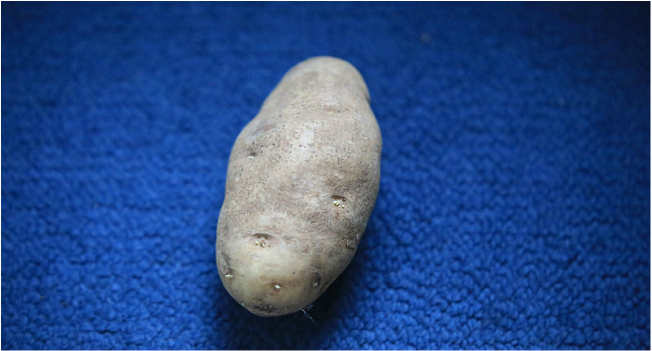Genetically Modified Potatoes Contain 70% Fewer Cancer-Causing Compounds Than “Organic” Ones5/23/2016
The Stanford Marching Band once scattered from POTATO to NOTATO during their infamous field show, "These Irish, Why Must They Fight?" at the University of Notre Dame. The joke, while hilarious, did not go over well.
Turns out the potato famine was devastating and killed millions of people. The good news is! Scientists are working on a modified potato that is resistant to late blight (the cause of the famine), so nothing like that will ever happen again.
Now that is worth celebrating!
Indeed, using a technique called RNA interference (RNAi), scientists at the J. R. Simplot Company have already managed to silence the genes that cause potatoes to bruise and turn brown when exposed to air.
Here's a short but fun explanation of how RNAi works:
This new spud, dubbed Innate (because it doesn’t contain genes from any other species), is a victory for the environment – each year, roughly 30% of harvested potatoes are thrown into the trash due to bruises and browning.
But these potatoes aren’t just good for Mother Nature. They’re also good for us. According to National Geographic, Innate potatoes contain 70% less of an amino acid called asparagine. When exposed to high temperatures, asparagine transforms into the cancer-causing compound acrylamide. The next step is eliminating vulnerability to blight -- and that's exactly what scientists are doing. According to the BBC (who, for what it's worth, is not secretly owned by Monsanto), "The speed with which [blight] takes hold and the devastating impacts on the crop make it the number one threat to six million tonnes of potatoes produced in the UK each year. Farmers have to be continuously on their guard and need to spray up to 15 times a season to protect against the disease... In the third year of the trial, all the non-GM potatoes became infected with late blight by August while the modified vegetables remained fully resistant to the end of the experiment. There was also a difference in yield, with the GM variety producing double the amount of tubers. The scientists say that since the potatoes are grown from tubers rather than seeds, they are sterile and the issue of GM pollen escaping into the wild does not arise." Surprised? Despite the myths you may have heard, many GMOs reduce pesticide use, not increase them. (Additionally, despite what you may have heard, organic famers use pesticides, too.) To those who understand science, this is super exciting. I love seeing laboratory learning applied to life-saving innovations. And, as Professor Jonathan Jones, of the Sainsbury Laboratory, said in a 2014 interview, "I think it is better to control disease with genetics than with chemistry." As a reminder to those who aren’t scientists: there is scientific consensus about the safety of most GMOs – though, obviously, each genetically modified organism should be evaluated individually. Saying “all GMOs are dangerous/safe” is kind of like saying “all chemicals are dangerous/safe.” Everything we eat is a chemical – and obviously some foods are very healthy for us because of the chemicals in them, while some chemicals can kill us. To further ease your mind, here’s an interactive tutorial about how RNAi works, produced by PBS. *** Want to know more? Don't miss:
And, of course, don't miss the Leland Stanford Junior Marching Band's infamous Spotted Owl Show, in which OWL turns into AWOL. (I couldn't find the Fighting Irish video, but this one's just as good.)
Sadly, GMOs did not save the spotted owl.
1 Comment
John
4/26/2017 10:20:34 am
Found this through Quora. Wish I could upvote twice, once for the science, and once for the Spotted Owl Show.
Reply
Leave a Reply. |
About the Author

Eva is a content specialist with a passion for play, travel... and a little bit of girl power. Read more >
Want to support The Happy Talent? CLICK HERE!
Or Find me on Patreon!
What's Popular on The Happy Talent:
Trending in Dating and Relationships:
What's Popular in Science: Playfulness and Leisure Skills:
Popular in Psychology and Social Skills:
Categories
All
|



























 RSS Feed
RSS Feed